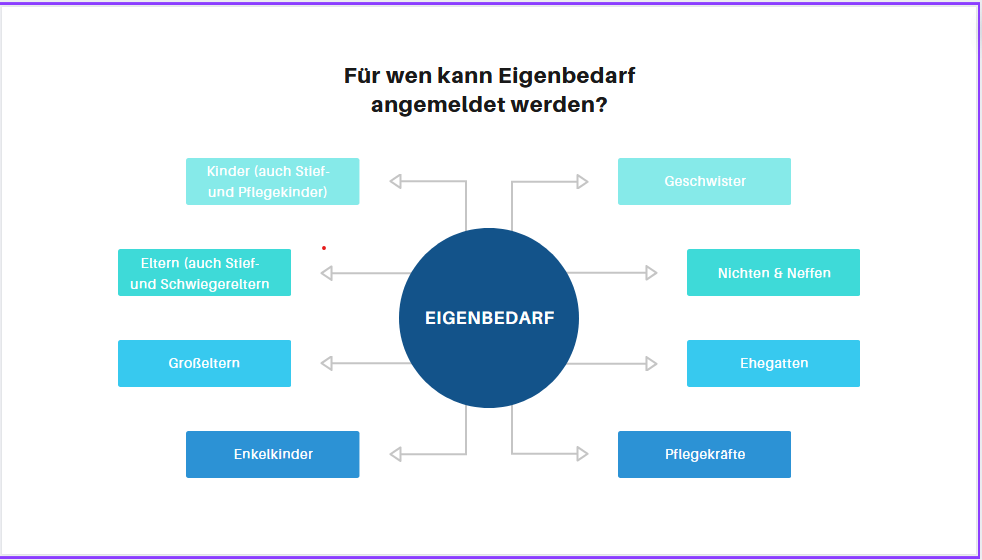Federal Court of Justice, 23 November 2011, Ref.: VIII ZR 74/11
We have already reported several times here on the requirements and options for the landlord to give notice of termination for personal use.
Partnerships are not authorised to terminate a tenancy agreement for their own use.
Prerequisites for the landlord's cancellation.
Requirements for the content of a personal use cancellation.
According to Section 573 (1) BGB, the landlord can terminate the tenancy if he has a legitimate interest in terminating the tenancy.
Excluded grounds for termination are, for example, a rent increase or the intention to sell the property before or after the conversion.
According to Section 573 (2) BGB, the landlord has a legitimate interest in terminating the tenancy in particular if
1. the tenant has culpably and not insignificantly breached his contractual obligations,
2. the landlord requires the rooms as accommodation for himself, his family members or members of his household ("personal use termination") or
3. the landlord would be prevented from making reasonable commercial use of the property by the continuation of the tenancy and would suffer considerable disadvantages as a result.

The above-mentioned judgement of the Federal Court of Justice dealt with the question of whether a civil law partnership (GbR) can invoke a personal requirement in the person of a partner even if this partner was not yet a member of the partnership when the rental agreement was concluded or when the partnership entered into an existing rental agreement.
Facts of the Case:
The civil-law partnership (GbR or BGB-Gesellschaft) cancelled the lease for personal use
The plaintiff, a civil law partnership, requested the defendants to vacate a flat on the basis of a notice of termination which it had given due to the personal use of its two partners and their son.
The defendant had rented the flat in dispute from the then owners in 1981.
In 2000, a company later known as "Eigentümergemeinschaft W. -D. -Str. GdbR M. u. a." (hereinafter referred to as "GdbR M.") acquired the property and continued the tenancy with the defendant.
In August 2004, the plaintiff joined this company by acquiring shares and was entered in the land register as an additional shareholder in December 2004.
With the agreement of October 2005, the division of the GdbR M. was carried out and the property was divided in accordance with § 3 WEG.
The plaintiff was then entered in the land register as the owner of the flat rented to the defendant in April 2006.
Immediately afterwards, the plaintiff declared the termination of the tenancy based on personal use.
After the local court had initially dismissed the action, the regional court ordered the defendant to vacate the property.
The defendant's appeal, which was authorised by the Court of Appeal, was directed against this.
Judgement of the Federal Court of Justice
The BGH agreed with the opinion of the Regional Court and thus with the plaintiff.
In the opinion of the BGH, the defendant was obliged to vacate the rented flat because the plaintiff's notice of termination for personal use had properly terminated the tenancy.
Upon entry in the land register, the plaintiff assumed the position of landlord, as there was an uninterrupted chain of sale from the original owners and landlords to the plaintiff.
Initially, GdbR M. had acquired the property from the original owners and landlords and had become the landlord.
In the course of the dissolution of the company and the division of the property, the tenancy was then transferred to the plaintiff in accordance with Section 566 (1) BGB (by analogy).
In this respect, the division of GdbR M. and the division of the property were to be regarded as a single legal transaction, through which a change of legal ownership from GdbR M. to the plaintiff had taken place.
The fact that the plaintiff had previously been a partner in GdbR M. did not stand in the way of this, because the concept of sale in the context of Section 566 (1) BGB was not identical to that of Section 577a (1) BGB.
The term "sale" in the context of Section 566 (1) BGB should be interpreted more broadly because the property interests of the old and new landlords/owners must also be taken into account and it must be ensured that the tenancy agreement is not unnecessarily complicated for formal reasons.
The personal use asserted by the plaintiff was also proven on the basis of the taking of evidence.
The waiting period of Section 577a BGB would not apply in the present case because the flat in dispute had not been sold after condominium ownership was established.
An analogous application of Section 577a (1) and (2) BGB is ruled out because there is no unintended loophole in the law and the structure in question is not covered by the protective purpose of Section 577a BGB.
In particular, the transfer of ownership and tenant status from GdbR M. to the plaintiff did not create any new personal requirements that had not existed up to that point in time.
Source: Federal Court of Justice
Important Note: The content of this article has been prepared to the best of our knowledge and belief. However, due to the complexity and constant evolution of the subject matter, we must exclude liability and warranty. Important Notice: The content of this article has been created to the best of our knowledge and understanding. However, due to the complexity and constant changes in the subject matter, we must exclude any liability and warranty.
If you need legal advice, feel free to call us at 0221 – 80187670 or email us at info@mth-partner.de.
Lawyers in Cologne advise and represent clients in tenancy law




